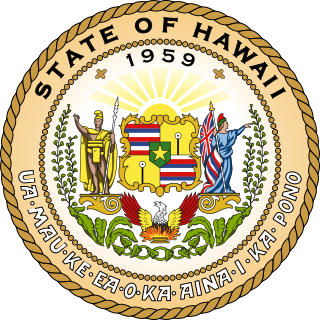
Harry Kim is an American politician who is the mayor of Hawaii County. He previously served as mayor from 2000 to 2008. Before that, he was the county's civil defense director.

The Hawaii gubernatorial election of 2006 was held on November 7, 2006. Incumbent Linda Lingle was the first Republican elected governor of Hawaii since 1962. Although 2006 was a strong election year for Democrats, Lingle won re-election by a landslide owing to an economic rebound in the state that occurred during her tenure after tremulous decade for the state economy during the 90's and early 2000's. As of 2019, this is the most recent election in which a Republican was elected Governor of Hawaii.

The 2006 Oregon gubernatorial election took place on November 7, 2006. Incumbent Democratic Governor of Oregon Ted Kulongoski ran for a second and final term as governor. Kulongoski faced several challengers in his primary, whom he dispatched to win his party's nomination a second time, while Republican nominee Ron Saxton, the former Chair of the Portland Public Schools Board and a candidate for governor in 2002 emerged from a crowded primary. Kulongoski and Saxton were initially going to be challenged in the general election by State Senator Ben Westlund, but Westlund withdrew his candidacy before the general election. There were, however, a number of strong independent challengers, the most notable of whom was Mary Starrett, the Constitution Party nominee. In a hard-fought campaign, Kulongoski won re-election by a surprisingly wide margin, winning his second term as governor.

United States gubernatorial elections were held on November 5, 2002 in 36 states and two territories. The Republicans won eight seats previously held by the Democrats, as well as the seat previously held by Minnesota governor Jesse Ventura, who was elected on the Reform Party ticket but had since renounced his party affiliation. The Democrats won 10 seats previously held by the Republicans, as well as the seat previously held by Maine governor Angus King, an independent. Overall, the Republicans suffered a net loss of one seat while the Democrats made a net gain of three. The Republicans managed to maintain their majority of state governorships, but it was reduced to a margin of only two seats. The elections were notable for the sheer number of state governorships that changed parties – 20 in total, constituting more than half of the seats up for election.

The 1998 Idaho gubernatorial election was held on November 3, 1998 to elect the Governor of Idaho. Phil Batt, the Republican incumbent, chose not to run for a second term. The Republican nominee, United States Senator Dirk Kempthorne, handily defeated the Democratic nominee, former Idaho Supreme Court justice Robert C. Huntley, to keep the seat in GOP hands.

The 2002 Idaho gubernatorial election was held on November 5, 2002 to select the governor of the state of Idaho. Dirk Kempthorne, the Republican incumbent, defeated Democratic nominee Jerry Brady to win a second term, but the win was not nearly as overwhelming as Kempthorne's 1998 victory.

The 2010 United States Senate election in Hawaii took place on November 2, 2010 concurrently with elections to the United States Senate in other states as well as elections to the United States House of Representatives and various state and local elections. The primary elections were held on September 18, 2010. Incumbent Democratic U.S. Senator and President pro tempore Daniel Inouye won re-election to his ninth term.

The 2002 Hawaii gubernatorial election was held on November 5, 2002 to select the Governor of Hawaii. Incumbent Democratic Governor of Hawaii Ben Cayetano was term-limited and therefore could not run for re-election. Former Maui Mayor Linda Lingle, who had narrowly lost the 1998 election, was nominated once again by the Republicans while Lieutenant Governor Mazie Hirono earned the Democratic nomination in a tightly fought race. Lingle and Hirono duked it out in a toughly-fought campaign, with Hirono's campaign crippled by allegations of corruption within the Hawaii Democratic Party and many voters desiring a change. Ultimately, Lingle won out over Hirono in one of the state's closest gubernatorial elections, allowing her to become the first Republican Governor of Hawaii since 1962 and the state's first female Governor ever.

The 1998 United States Senate election in Alaska was held November 3, 1998. Incumbent Republican United States Senator Frank Murkowski sought re-election to a fourth term in the United States Senate. Murkowski easily won re-election against Democratic nominee Joseph Sonneman, a perennial candidate, earning nearly 75% of the vote.

The New Mexico gubernatorial election of 1998 contest to elect the next Governor of New Mexico. The winner of the election would serve a term from January 1, 1999 until January 1, 2003. Incumbent Republican Governor Gary Johnson was eligible and ran for re-election and was re-elected.

The 1994 Hawaii gubernatorial election was held on November 3, 1994. Incumbent Democratic Governor of Hawaii John D. Waihee III was prevented from seeking a third term as Governor due to term limits, creating an open seat. Lieutenant Governor Ben Cayetano emerged from a crowded primary to become the Democratic nominee, facing off against former Administrator of the Small Business Administration Pat Saiki, the Republican nominee and Honolulu Mayor Frank Fasi, who ran as the Best Party of Hawaii's nominee. In a very close election, Cayetano narrowly edged out Fasi, who placed second, and Saiki, who placed third, winning only a plurality of the vote. Fasi's performance was notable in that it was the best performance by a third party gubernatorial candidate in Hawaii's history.

The 2012 United States Senate election in Hawaii took place on November 6, 2012, concurrently with the 2012 U.S. presidential election as well as other elections to the United States Senate and House of Representatives and various state and local elections. Incumbent Democratic U.S. Senator Daniel Akaka decided to retire instead of running for re-election to a fourth term. Democratic Congresswoman Mazie Hirono defeated former Hawaii Governor Linda Lingle in a rematch of the 2002 Hawaii gubernatorial election.

The 2012 Honolulu mayoral election was held on Tuesday, November 6, 2012, to elect the Mayor of the City and County of Honolulu. Kirk Caldwell was elected mayor, beating opponent and former Hawaii governor Ben Cayetano.

The 2014 Hawaii gubernatorial election took place on November 4, 2014, to elect the Governor of Hawaii, concurrently with a special election to Hawaii's Class III Senate Seat, as well as other elections to the United States Senate in other states and elections to the United States House of Representatives and various state and local elections.

The 2016 United States Senate election in Hawaii was held November 8, 2016, concurrently with the 2016 U.S. presidential election as well as other elections to the United States Senate and House of Representatives and various state and local elections. The primaries were held August 13.

The 2014 United States House of Representatives elections in Hawaii were held on Tuesday, November 4, 2014 to elect the two U.S. Representatives from the state of Hawaii, one from each of the state's two congressional districts. The elections coincided with the elections of other federal and state offices, including an election for Governor of Hawaii and a special election to the United States Senate.

The 2018 Hawaii gubernatorial election took place on November 6, 2018, to elect the Governor of Hawaii and Lieutenant Governor of Hawaii.























